- Deutsch
-
EnglishDeutschItaliaFrançais日本語한국의русскийSvenskaNederlandespañolPortuguêspolskiSuomiGaeilgeSlovenskáSlovenijaČeštinaMelayuMagyarországHrvatskaDanskromânescIndonesiaΕλλάδαБългарски езикAfrikaansIsiXhosaisiZululietuviųMaoriKongeriketМонголулсO'zbekTiếng ViệtहिंदीاردوKurdîCatalàBosnaEuskeraالعربيةفارسیCorsaChicheŵaעִבְרִיתLatviešuHausaБеларусьአማርኛRepublika e ShqipërisëEesti Vabariikíslenskaမြန်မာМакедонскиLëtzebuergeschსაქართველოCambodiaPilipinoAzərbaycanພາສາລາວবাংলা ভাষারپښتوmalaɡasʲКыргыз тилиAyitiҚазақшаSamoaසිංහලภาษาไทยУкраїнаKiswahiliCрпскиGalegoनेपालीSesothoТоҷикӣTürk diliગુજરાતીಕನ್ನಡkannaḍaमराठी
Erkundung der führenden Halbleiterunternehmen
- 2024/10/25
- 332
Katalog
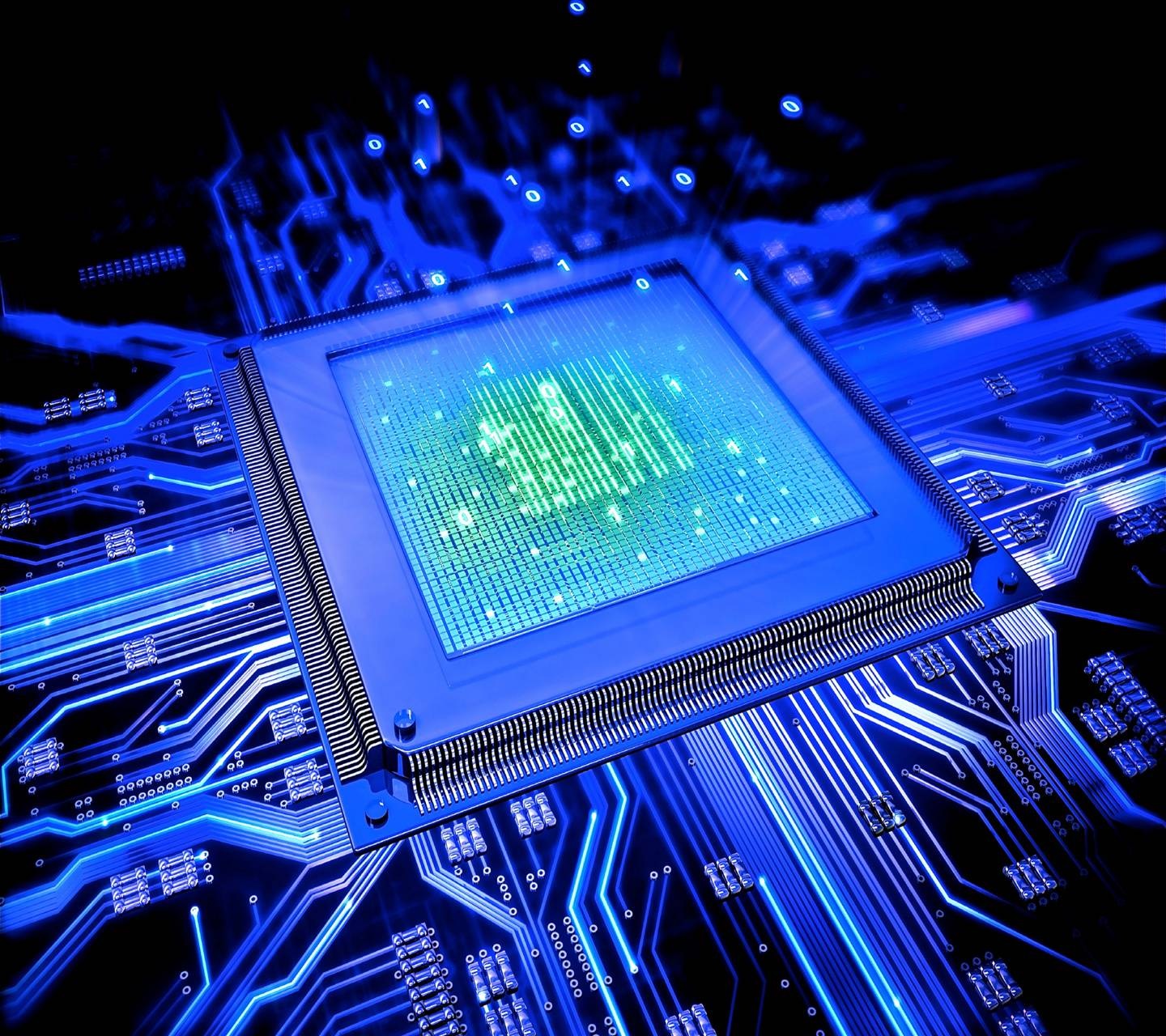
Erforschung der Komplexität von Halbleitern
Halbleiter sind Materialien, die eine elektrische Leitfähigkeit zwischen einem Leiter und einem Isolator haben und in allen modernen Elektronik sehr wichtig sind.Halbleiter sind an der Herz der Mikroprozessoren, Transistoren und viele andere Komponenten.Silizium, das am häufigsten verwendete Material in Halbleitern, hat Begriffe wie "Silicon Valley" und "Silicon Economy" hervorgebracht, wobei die Bedeutung von Silizium in der Technologiebranche betont.
Halbleiter ermöglichen die Funktionen von Geräten Das versorgt alles von Kommunikationsnetzwerken bis hin zu Unterhaltungselektronik.Sie sind erforderlich, um Hochgeschwindigkeits-Internet, Datenspeicherung und miteinander verbundene digitale Welt zu unterstützen.Darüber hinaus verfügt die Halbleitertechnologie über Anwendungen in Satellitennetzwerken, Radarsystemen für die Flugverkehrskontrolle, die Wettervorhersage und vieles mehr.Über die Kommunikation hinaus erleichtern Halbleiter die Entwicklung von Mikrowellen-, Funkfrequenz- und Millimeter-Wellen-Technologien und lösen Herausforderungen wie Signalabdeckung und Energieeffizienz.Aufgrund ihrer tiefgreifenden Auswirkungen auf die Gesellschaft wurden Halbleiter neben der Druckmaschine, Elektrizität und Penicillin zu den wichtigsten Erfindungen in der Geschichte gehören.
Führende Halbleiterfirmen
Halbleiterunternehmen sind das Rückgrat der digitalen Welt und führen alles von persönlichen Geräten bis hin zu industriellen Anwendungen an.Diese Unternehmen entwerfen und produzieren die Komponenten, die erweiterte Computer-, Kommunikations- und Elektroniktechnologien ermöglichen.In diesem Abschnitt sehen wir uns zehn der führenden Halbleiterunternehmen genauer an, die die Zukunft der Technologie prägen.
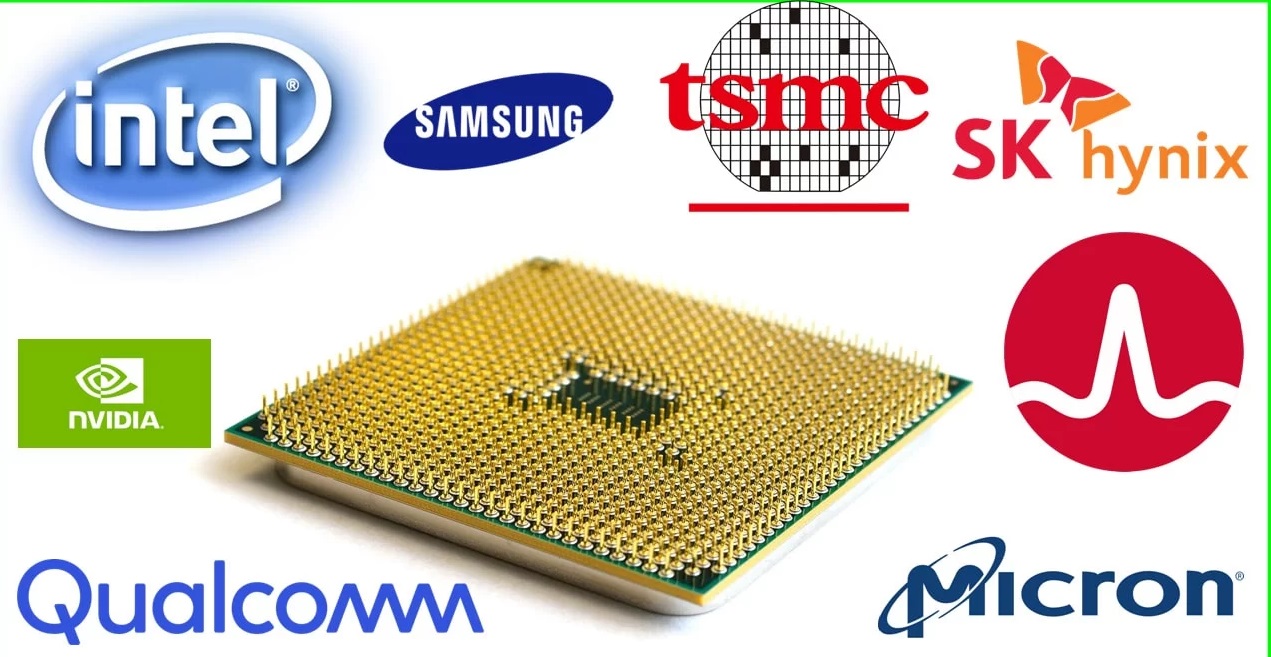
Intel Corporation (INTC)
Intel, das 1968 gegründet wurde, ist eine amerikanische multinationale Gesellschaft, die für die Entwicklung zentraler Verarbeitungseinheiten (CPUs) und Halbleitertechnologien bekannt ist.Intel ist eines der weltweit führenden Halbleiterunternehmen und hat bei der Weiterentwicklung des persönlichen Computing eine wichtige Rolle gespielt.In seiner 50-jährigen Geschichte hat Intel konsequent in Produktinnovationen geleitet, insbesondere in der Gestaltung und Herstellung von Mikroprozessoren.
Als weltweit größter Anbieter von CPU -Prozessoren ist der Einfluss von Intel in Verbraucher- und Enterprise -Computing -Umgebungen allgegenwärtig.Die Produkte des Unternehmens umfassen Mikroprozessoren, Chipsätze, Systeme und Software, die die Grundlage für die Standard -Computerarchitektur bilden.Diese Bausteine ermöglichen es Branchen, modernste Computer, Server und Netzwerklösungen zu entwerfen und herzustellen.Intel wagte sich auch in die Verarbeitung von Audio-/Video -Signalverarbeitung, künstliche Intelligenz und 5G -Technologien und setzte seine Tradition des technologischen Fortschritts fort.Die globalen Forschungs- und Entwicklungsbemühungen von Intel umfassen die Zusammenarbeit mit akademischen Institutionen und staatlichen Labors, wie der Partnerschaft mit dem Institut für Computertechnologie an der chinesischen Akademie der Wissenschaften.
Samsung Electronics
Samsung Electronics, die Flaggschiff -Tochter der Samsung Group in Südkorea, ist weltweit führend in der Herstellung von Elektronik und Halbleiter.Samsung wurde 1969 gegründet und wurde durch Einnahmen zum zweitgrößten Mobilfunkhersteller der Welt und zu den führenden Halbleiterunternehmen.Während Samsung weithin für seine Unterhaltungselektronik wie Smartphones, Fernseher und Haushaltsgeräte bekannt ist, ist seine Halbleiterabteilung ein wichtiger Bestandteil des Erfolgs des Unternehmens.Samsung produziert Speicherchips, Prozessoren und Speicherlösungen, die in Geräten in allen Branchen verwendet werden.Der globale Betrieb des Unternehmens umfasst mehrere Sektoren, einschließlich Finanzen, Maschinen und Chemikalien, aber sein Elektronikgeschäft bleibt am profitabelsten.
Samsung hat eine wichtige Rolle bei der Weiterentwicklung von Gedächtnistechnologien gespielt, insbesondere im Dynamic Random-Access Memory (DRAM) und im NAND-Flash-Speicher, die beide für die Funktionalität moderner Geräte erforderlich sind.Trotz des starken Wettbewerbs bleibt Samsung dank seiner Innovation sowohl in mobilen als auch in der industriellen Lösungen ein dominierender Akteur auf dem globalen Halbleitermarkt.
Taiwan Semiconductor Manufacturing Company (TSMC)
TSMC ist der weltweit größte Halbleiterhersteller, der häufig als "Gießerei" bezeichnet wird, da es von anderen Unternehmen entworfene Chips produziert.TSMC wurde 1987 gegründet und war die erste engagierte Halbleiter-Gießerei der Welt und hat seine Führungsposition durch hochmoderne Herstellungsprozesse beibehalten.TSMC mit Sitz in Hsinchu, Taiwan, ist auf hochpräzise Technologie spezialisiert und produziert fortschrittliche Halbleiterchips für Branchen, die von Smartphones bis zu Rechenzentren reichen.Das Unternehmen stellt jährlich mehr als 4,3 Millionen Wafer her und kontrolliert rund 50% des globalen Wafer -Gießereimarktes.Die Kundschaft von TSMC umfasst Tech -Giganten wie Apple, Qualcomm und Nvidia, die sich auf das Know -how von TSMC verlassen, um ihre anspruchsvollen Chip -Designs herzustellen.
TSMC hat eine expansive globale Präsenz mit Waferherstellungsanlagen in Taiwan, den USA, China und anderen wirtschaftlich fortgeschrittenen Regionen.Das Engagement des Unternehmens für Innovation und Qualität gewährleistet das anhaltende Wachstum der stark wettbewerbsfähigen Halbleiterindustrie.
Qualcomm (Qcom)
Qualcomm wurde 1985 gegründet und hat seinen Hauptsitz in San Diego und ist ein weltweit führender Anbieter für drahtlose Kommunikationstechnologien, die für seine Pionierarbeit in 3G-, 4G- und 5G -Netzwerken bekannt sind.Qualcomm Designs und Lizenzentechnologie von vielen der weltweit größten Hersteller von Mobilgeräten verwendet.Die Snapdragon -Prozessoren von Qualcomm werden häufig in Smartphones und Tablets verwendet, die für ihre hohe Leistung und ihren geringen Stromverbrauch bekannt sind.Über mobile Geräte hinaus leitet Qualcomm die Anklage bei der Entwicklung von drahtlosen Technologien für Automobilsysteme, Gesundheitsgeräte, intelligente Häuser und sogar intelligente Städte.Die Innovationen von Qualcomm haben dazu beigetragen, die drahtlose Kommunikation zu verändern und Menschen und Geräte auf der ganzen Welt zu verbinden.
Das Geschäftsmodell von Qualcomm umfasst die Lizenzierung seines umfangreichen Portfolios an drahtlosen Patenten für andere Hersteller, wobei es in globaler Telekommunikation hergestellt wird.Die mobilen Prozessoren von Snapdragon sind für ihre Effizienz, Multimedia -Funktionen und umfassende Konnektivitätslösungen anerkannt, die viele Sektoren der Tech -Industrie vorantreiben.
Broadcom (AVGO)
Broadcom, ein Semiconductor Company mit Hauptsitz in Irvine, Kalifornien.Broadcom bietet System-on-Chip-Lösungen (SOC) für eine Vielzahl von Anwendungen, einschließlich Rechenzentren, mobiler Geräte und Breitbandnetzwerke.Die Produkte des Unternehmens ermöglichen eine nahtlose Bereitstellung von Sprach, Video und Daten in und von Häusern, Büros und mobilen Umgebungen.Broadcom ist einer der größten Hersteller von Networking- und drahtlosen Halbleiterprodukten und erzielt einen Jahresumsatz von Milliarden.Das Unternehmen hat ein riesiges Portfolio für geistiges Eigentum mit Tausenden von Patenten im Zusammenhang mit Daten und Multimedia -Übertragung.Broadcoms SOC- und Software-Lösungen von Broadcom sind insbesondere für den Betrieb von Hochgeschwindigkeits-Internet- und digitalen Unterhaltungsplattformen wichtig.
Mit seiner Präsenz in Nordamerika, Asien und Europa hat sich Broadcom als wichtige globale Halbleiterlieferanten etabliert, der für seine Hochleistungsprodukte bekannt ist, die die Infrastruktur der digitalen Welt unterstützen.
SK Hynix
SK Hynix ist der zweitgrößte Halbleiterhersteller Südkoreas und der drittgrößte Hersteller von Dram-Chips weltweit.Das Unternehmen wurde 1983 als Hyundai Electronics gegründet und wurde 2001 als Hynix umbenannt und wurde später Teil der SK -Gruppe.zu Datenspeichersystemen.Die Speicherlösungen des Unternehmens werden häufig in den Anwendungen von Unterhaltungselektronik, Computing und Automobilanwendungen eingesetzt.SK Hynix hat eine starke globale Präsenz mit den Produktionsanlagen in Südkorea, China und den Vereinigten Staaten.SK Hynix spielt in der globalen Halbleiter-Lieferkette mit seinen hochmodernen Herstellungsprozessen und der groß angelegten Produktionskapazität eine entscheidende Rolle und bietet für einige der weltweit führenden Technologieunternehmen Speicherlösungen.
Mikron -Technologie (MU)
Micron Technology mit Sitz in Boise, Idaho, ist ein weltweit führender Hersteller von Speicher- und Speicherlösungen.Micron wurde 1978 gegründet und erzeugt DRAM-, NAND-Flash-Speicher und Solid-State-Laufwerke (SSDs) für die Verwendung in mobilen Geräten, Rechenzentren und Unterhaltungselektronik.Die Produkte von Micron sind erforderlich, um die datengesteuerte Welt zu unterstützen und leistungsstarke Speicherlösungen bereitzustellen, die alles von Smartphones bis hin zu Cloud-Computing auf Unternehmensebene ausführen.Die Innovationen des Unternehmens in der Speichertechnologie haben es zu einem führenden Markt für den globalen Markt gemacht, wobei seine Produkte in allem von persönlichen Geräten bis hin zu Automobil- und Industrieanwendungen verwendet werden.Micron überschreitet weiterhin die Grenzen des Halbleitergedächtnisses und trägt dazu bei, die wachsende Nachfrage nach schnelleren und effizienteren Speicherlösungen in einer zunehmend digitalen Welt zu befriedigen.
Texas Instrumente (TI)
Texas Instruments (TI) wurde 1930 gegründet und ist weltweit führend in analogen und eingebetteten Verarbeitungstechnologien.Die Halbleiterprodukte von TI werden in Branchen wie Automobil-, Industrie- und Unterhaltungselektronik häufig eingesetzt.Das Unternehmen ist am besten für seine analogen Chips und digitalen Signalprozessoren (DSPs) bekannt, die zum Umwandeln von Signalen in digitale Daten konvertiert werden.Die Halbleiter von TI sind in einer Vielzahl von Geräten zu finden, von Smartphones bis hin zu Industriemaschinen, was es sowohl im Verbraucher- als auch im Industriesektor zu einem wichtigen Akteur macht.Mit dem Fokus auf Innovationen in Bereichen wie Leistungsmanagement, Sensing und Signalverarbeitung führt TI weiterhin die Branche bei der Entwicklung von Lösungen für moderne Elektronik.
Toshiba
Toshiba ist Japans größter Halbleiterhersteller auf dem globalen Markt.Toshiba wurde 1875 gegründet und hat eine lange Geschichte der Innovation in Elektronik und Halbleitern.Das Unternehmen produziert eine breite Palette von Produkten, darunter Speicherchips, Unterhaltungselektronik und Industriesysteme.Die Halbleiterabteilung von Toshiba konzentriert sich auf den NAND-Flash-Speicher, der in einer Vielzahl von Anwendungen verwendet wird, von Smartphones über Datenspeicher auf Unternehmensebene.Das Unternehmen hat sich erfolgreich von einem Consumer Electronics -Riese zu einem führenden Unternehmen in der IT- und Halbleiterindustrie verwandelt und seinen Wettbewerbsvorteil durch ständige Innovationen bewahrt.
NXP -Halbleiter (NXPI)
NXP Semiconductors mit Sitz in den Niederlanden ist ein führender Anbieter von Halbleiterlösungen für Automobil-, Mobil- und sichere Identifikationsanwendungen.NXP wurde 2006 gegründet und hat sich als Hauptakteur im Sektor der Automobilelektronik etabliert, insbesondere in Bereichen wie Secure Vehicle Communication und Advanced Triver Assistance Systems (ADAs).Die Produkte von NXP werden häufig in Anwendungen wie kontaktlosen Zahlungen, Smart City -Infrastruktur und Automobilelektronik verwendet. Sie sind der Anbieter von Halbleitern für die nächste Generation angeschlossener Geräte.Mit dem Fokus auf sichere Konnektivität und eingebettete Lösungen trägt NXP dazu bei, Innovationen im Internet der Dinge (IoT) und die Automobilindustrie voranzutreiben.
Verständnis des Wachstums im Sektor der Halbleiterausrüstung
Die weltweite Nachfrage nach Halbleitern hat zu einem entsprechenden Markt für Halbleiterherstellungsgeräte geführt.Die Halbleiterausrüstungsindustrie für die Weiterentwicklung der Fähigkeiten der Chipproduktion und ermöglicht den Herstellern, den wachsenden Bedürfnissen von Branchen wie Elektronik, Automobile und Telekommunikation gerecht zu werden.
Nach Angaben der International Semiconductor Equipment Materials Materials Industry Association (SEMI) erreichte der globale Verkauf von Halbleiterausrüstung 64,5 Milliarden US -Dollar im Jahr 2018, mit einer zusammengesetzten jährlichen Wachstumsrate (CAGR) von 14,52% aus 2014.Dieses Wachstum wurde von der steigenden Nachfrage nach fortgeschrittenen Halbleitern getrieben, die bei aufstrebenden Technologien wie Cloud Computing, IoT und künstlicher Intelligenz verwendet wurden.Trotz einer vorübergehenden Verlangsamung im Jahr 2019 prognostiziert Semi, dass sich der Markt für Halbleiterausrüstung erholen und weiter wachsen wird, wobei der Umsatz voraussichtlich erreicht wird 71,9 Milliarden US -Dollar in den kommenden Jahren.Da die Branchen zunehmend auf fortschrittliche Halbleiter für Innovationen angewiesen sind, werden die für die Herstellung dieser Chips verwendeten Geräte eine wichtige Rolle bei der Gestaltung der Zukunft der Technologie spielen.
Häufig gestellte Fragen [FAQ]
1. Was sind die Top -Halbleiteraktien?
Die folgenden Halbleiteraktien gehören derzeit zu den Top -Performen:
- QCOM: Qualcomm Incorporated (NASDAQ: QCOM) - $ 140.57
- AAPL: Apple Inc. (NASDAQ: AAPL) - $ 133.00
- ASML: ASML hält N.V. (NASDAQ: ASML) - $ 634.32
- TSM: Taiwan Semiconductor Manufacturing Company Limited (NYSE: TSM) - $ 122.80 $
- NVDA: NVIDIA CORPORATION (NASDAQ: NVDA) - $ 576.00
- INTC: Intel Corporation (NASDAQ: INTC)
- AMD: Advanced Micro Devices, Inc. (NASDAQ: AMD)
2. Wer ist der größte Chiphersteller?
Die Intel Corporation gilt als der weltweit größte Halbleiter -Chip -Hersteller, basierend auf seinen Verkaufszahlen aus dem Jahr 2020. Es ist auch dafür bekannt, die X86 -Serie von Mikroprozessoren zu erfinden, die in PCs weit verbreitet sind.
3. Was ist der beste Halbleiteraktor?
Für 2021 gelten mehrere Halbleiteraktien als starke Investitionen:
- NVIDIA (NVDA) - Mit einer Marktkapitalisierung von 322 Milliarden US -Dollar zeichnet sich NVIDIA als größte amerikanische Halbleiterfirma aus.
- NXP -Halbleiter (NXPI)
- Analoge Geräte (ADI)
- Ambarella (Amba)
- Taiwan Semiconductor Manufacturing Company (TSM)
4. Was ist die beste 5G -Aktie zum Kauf?
Qualcomm (QCOM) mit einem Preis von 139,49 USD ist ein führender Anwärter auf dem 5G -Bereich, der für sein umfangreiches Portfolio an Patenten im Zusammenhang mit drahtloser Kommunikation bekannt ist.
5. Ist TSM ein guter Kauf?
Die Taiwan Semiconductor Manufacturing Company (TSM) gilt als starke Investition für langfristige Anleger.Der führende Marktanteil und die durchweg hohe Rendite für Eigenkapital (ROE) weisen auf eine starke Geschäftsqualität hin.Während der Aktienkurs von TSM voraussichtlich im Jahr 2021 steigen wird, stimmt das Wachstum möglicherweise nicht mit den im Jahr 2020 beobachteten Niveaus überein.
Verwandter Blog
-
Netzteilspannung Abkürzung: VCC VDD VEE VSS GND
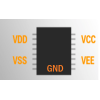
2024/06/6
Im modernen elektronischen Schaltungsdesign, Verständnis der Abkürzungen der Stromversorgungsspannung (wie VCC, VDD, VEE, VSS, GND).Diese Abkürzung... -
Ein Überblick über TTL- und CMOS -ICs und wie Sie zwischen ihnen wählen

2024/04/13
In diesem Artikel werfen wir einen detaillierten Blick auf zwei wichtige elektronische Technologien, komplementäre Metaloxid-Halbleiter (CMOS) und Tr... -
Verschiedene Arten von Sicherungen und Anwendungen

2024/04/18
Sicherungen sind wesentliche Komponenten in modernen elektrischen Systemen und fungieren als entscheidende Beschützer vor Überstrom.Sie arbeiten, in... -
Verständnis des C1815 -Transistors: Pinouts, Schaltungssymbole, Anwendungsschaltungen
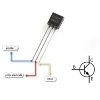
2023/12/20
Welche Art von Röhre ist der C1815?C1815 Triode PinoutC1815 ModellzeichnungC1815 -ParameterC1815 EigenschaftenAnwendung von C1815 Der C1815 -Transist... -
LR44 -Batterien: LR44 -Batterieäquivalente und LR44 -Batterieersatz

2024/01/24
In einem sich schnell entwickelnden technologischen Gebiet, in dem die Größe der elektronischen Geräte weiter schrumpfen und dennoch alltäglicher ... -
Leitfaden zu Buck-, Boost- und Buck-Boost-Konverter
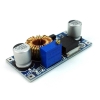
2023/12/21
Was ist ein Buck -Konverter?Wie funktioniert ein Buck Converter?Was ist ein Boost -Konverter?Wie funktioniert ein Boost -Konverter?Was ist ein Auftrie... -
Grundkenntnisse über Sicherungen: Merkmale, Arbeitsprinzipien, Typen und wie man richtig auswählt

2024/04/10
Sicherungen schützen Schaltungen vor Schäden aufgrund von Überlastung oder Kurzstrecken.Dieses einfache, aber geniale Gerät basiert auf einem leic... -
Gesamtzahl der Transistoren in einer CPU
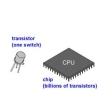
2024/06/14
In der modernen Computertechnologie ist die Beziehung zwischen der zentralen Verarbeitungseinheit (CPU) und den Transistoren zunehmend integraler gewo... -
Grunde elektronische Grundkomponenten verstehen - Widerstände, Kondensatoren, Dioden, Transistoren, Induktoren und digitale Logik -Tore
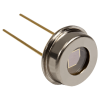
2024/04/13
Elektronische Komponenten sind der Eckpfeiler des Bauens und der Optimierung elektronischer Schaltkreise.Von gewöhnlichen Haushaltsgeräten bis hin z... -
Beschreiben Sie kurz die Spezifikationen, Verpackungen, das Arbeitsprinzip, die Vorteile und die Umweltauswirkungen von Lithium-Ionen-Batterien
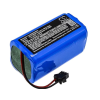
2024/03/20
Seit der Einführung von wiederaufladbaren Blei-Säure-Batterien im Jahr 1859 wurden sie allmählich in den Gewebe des technologischen Fortschritts ei... -
Beherrschen analoge und digitale Schaltungen: Ein Anfängerführer
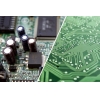
2023/12/20
Definition und Eigenschaften von analogen Schaltungen und digitalen SchaltungenDer Unterschied zwischen analogen Schaltungen und digitalen Schaltungen... -
Wie viele Spannungen sollte eine Autokatterie haben?

2024/08/25
Ist es wirklich genug zu sagen, dass eine Batterie bei 11,9 Volt oder höher "vollständig aufgeladen" ist?Diese Zahl bietet eindeutig eine Grundlinie... -
Transistor (BJT und MOSFET) Arbeitsprinzipien
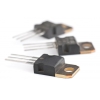
2023/12/20
Arbeitsprinzip des bipolaren Junction -Transistors (BJT)Auswahl der KomponentenwerteWie wählen Sie einen Transistor?Arbeitsprinzip von MOSFETWie scha...
Heiße Teile
- 0805YC102K4T2A
- HMK432B7474MM-T
- GRM2196S2A3R6CD01D
- TPSD157M010R0100
- MAX1416EUE+T
- AD5660BRJZ-2500RL7
- AD7899SR-1
- OPA4377AQPWRQ1
- 25AA640A-I/SN
- XRT83VSH316IB-F
- SN74HC132PWT
- ISO7242MDWR
- SML-D12Y8WT86
- VI-251-EW
- V24C36M100BL
- HMC413QS16G
- ADXL326BCPZ
- FZ400R65KE3
- V48C2V2C66BL3
- VI-PU33-EW
- MT29C2G24MAKJAJC-75IT
- SST32HF3281-70-4E-LS
- M34509G4HFP#U8
- SSM2402SZ-REEL
- ISB-A30-0-TBM-E
- BSS169H6327
- ISPLSI2032E-180LJ44
- M41T11-MH6
- G60N100BNTD
- HA12229F
- EDB8164B3PF-8D-F
- TC357520XBG
- FF60U60DN
- TC74ACT164FT
- PN65TEV1/207D65AK0
- MGFS152412
- T491A225K010AT4838
- T491D336M010ZTAU00
- BTS5577G
- PI74LPT244QA
- UCC28515DWTR
- BD9240FV
- EVM2WSX80BE2
- R5F212BASNFP#W4
- S29GL128N11FFIV2
- UPD814008F1-411-GAM-A
- VSP6234ZAKR
- BLM10D1822-61ABG


